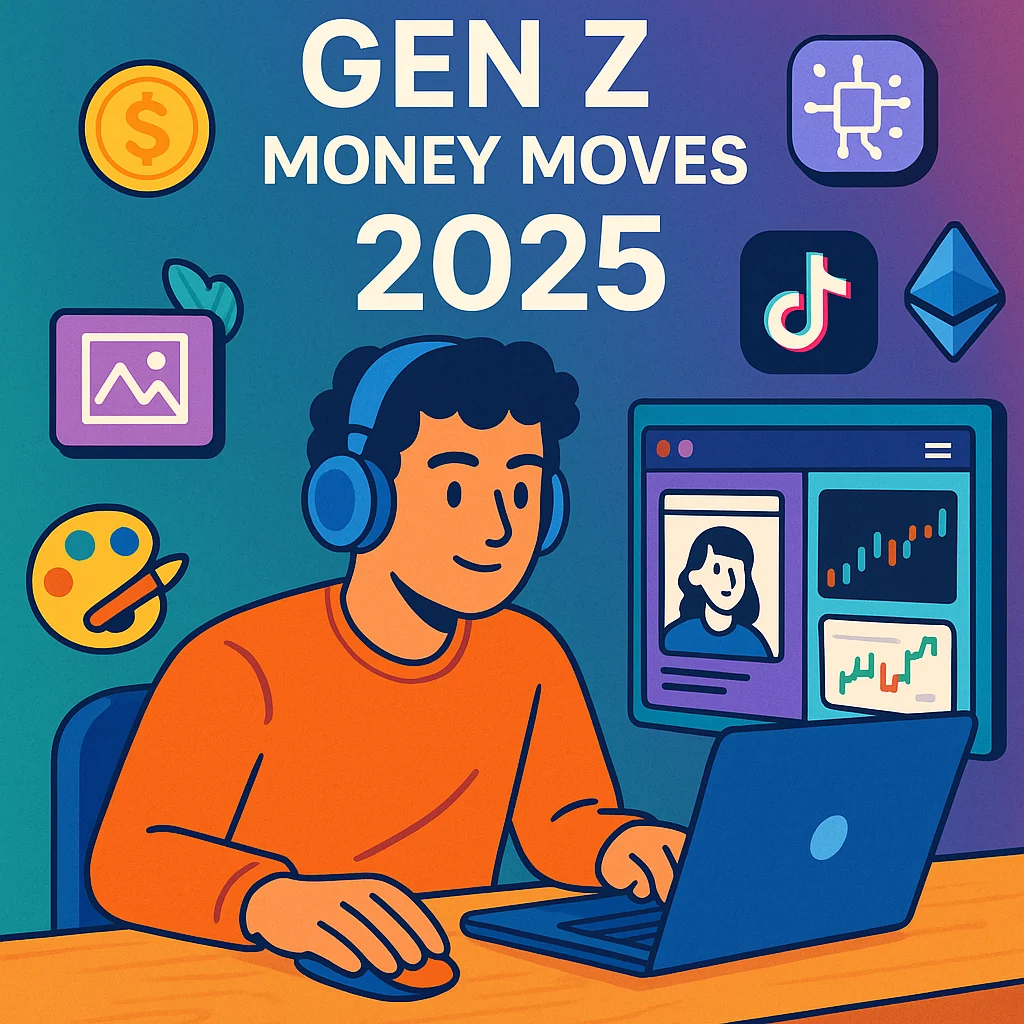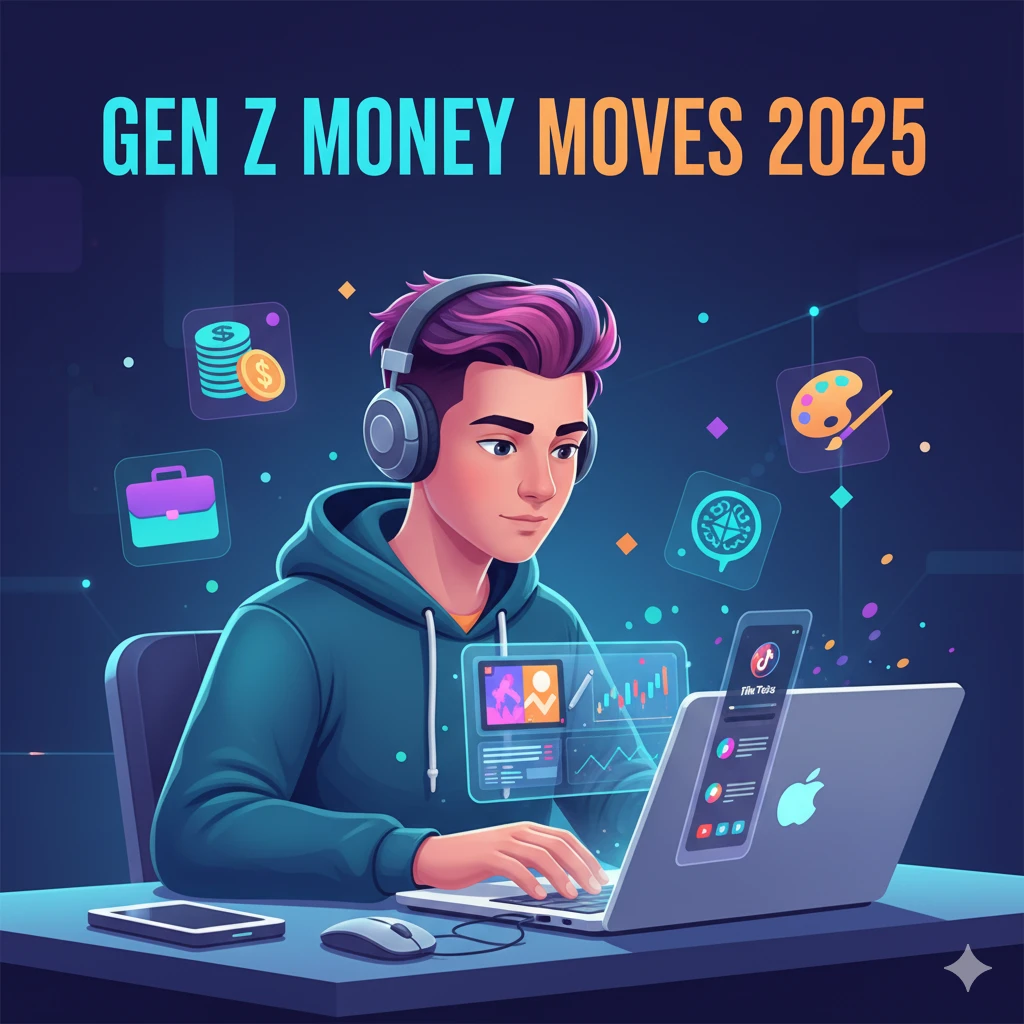When people think about money-making, they often imagine the usual path: study hard, land a stable 9–5, save, and slowly climb the ladder. But if you take a peek at Gen Z in 2025, that traditional formula feels outdated. This generation is rewriting the script. They’re not just chasing salaries—they’re building side hustles, monetizing hobbies, and creating income streams that didn’t even exist ten years ago.
Let’s break it down in a simple, real-talk way: Gen Z doesn’t just want to work for money. They want money to work for them and align with who they are.
Why Gen Z Thinks About Money Differently
Most of Gen Z grew up online. They saw creators turn from unknowns into millionaires. They saw crypto booms, NFT hype cycles, AI side hustles, and friends selling digital art on Instagram. On the flip side, they also witnessed economic instability—pandemic layoffs, rising living costs, and news about older generations struggling with debt.
So, naturally, they’re cautious but also experimental. For them, money isn’t just about stability—it’s about freedom, flexibility, and identity.
Picture a 22-year-old who works a remote customer support job for stability, streams on Twitch at night, sells stickers on Etsy, and puts $100 every month into index funds. That’s Gen Z’s style: multiple streams, personal branding, and experimenting with tools that previous generations didn’t even consider jobs.

Income Streams That Are Defining Gen Z in 2025
1. The Creator Economy 2.0
Being an influencer isn’t new, but the way it works in 2025 is very different. Gen Z isn’t all about chasing millions of followers. Instead, they’re focusing on niche communities and building loyal audiences.
- A college student might run a TikTok channel reviewing budget tech under $50.
- A fitness lover could earn through Instagram subscriptions where followers pay for weekly workout plans.
- Some even rely on platforms like Patreon, Ko-fi, or Substack to sell exclusive content.
The money doesn’t just come from ads anymore—it’s subscriptions, digital products, brand collaborations, and even micro-donations.
What’s interesting is how “relatable” creators often make more consistent income than flashy lifestyle influencers. People want trust, not perfection.
2. Freelancing and Remote Gigs
Platforms like Upwork, Fiverr, Contra, and even AI-driven gig boards are packed with Gen Z workers. Many are skipping the traditional job hunt and instead offering skills like:
- Video editing for YouTubers
- AI prompt engineering
- Social media management
- Podcast editing
- 3D design for virtual worlds
Gen Z is also bold about pricing. They know the value of their skills and often use online communities (like Discord groups or Reddit forums) to share rate cards and avoid undercharging.
3. Digital Products and Online Shops
Instead of opening physical stores, Gen Z is creating and selling digital goods that can be downloaded instantly. Things like:
- Notion templates for students or productivity geeks
- Digital art packs or wallpapers
- eBooks and mini-courses
- Canva templates for small businesses
The beauty? Once you create it, it can keep selling without extra work—what people call “semi-passive income.”
Etsy, Gumroad, and Shopify remain popular, but 2025 has seen a surge in smaller, niche marketplaces popping up for creators in specific industries.
4. Gaming and eSports Income
For Gen Z, gaming isn’t just a hobby—it’s a money-maker. Some are live-streaming on Twitch or YouTube Gaming, while others compete in eSports tournaments. Even casual gamers can monetize by:
- Selling in-game items or skins
- Running Discord communities with paid memberships
- Creating guides or walkthroughs for popular titles
It’s not rare to meet a 19-year-old making more from gaming side hustles than a traditional part-time job at a café.
5. Investing Early (and Differently)
Older generations often thought investing was for later in life. Gen Z isn’t waiting. Even with small budgets, they’re exploring:
- Fractional investing apps (where you can buy $10 worth of Apple stock instead of a whole share)
- Crypto staking and DeFi platforms (though more carefully than during the hype era)
- Crowdfunding real estate apps
- Long-term ETFs and index funds
Some treat investing like a game, but many are surprisingly disciplined—choosing safe options alongside riskier experiments.
6. Side Hustles That Feel Like Hobbies
Unlike older generations who separated “work” and “fun,” Gen Z often mixes the two. They monetize hobbies:
- A photography lover sells Lightroom presets.
- A bookworm earns affiliate income by recommending reads on TikTok.
- A fashion enthusiast thrifts clothes, flips them online, and documents the process on YouTube.
For them, it’s not about making millions from every hobby but stacking smaller incomes that add up.
7. AI-Powered Hustles
AI is Gen Z’s favorite tool in 2025. They don’t see AI as a threat—they see it as a teammate. Examples:
- Using AI to write first drafts of blogs, then polishing them into personal newsletters.
- Running micro-agencies where AI handles repetitive tasks (caption writing, basic video edits) while they focus on creativity.
- Selling AI-generated art, music, or voices (ethically, with clear labeling).
It’s about being smart enough to let AI do the boring parts while keeping the creative spark human.
The Shift in Mindset: Money = Freedom, Not Just Stability
If millennials often talked about “financial security,” Gen Z talks about “financial freedom.” They don’t want to just pay bills; they want the flexibility to travel, quit a toxic job, or take six months off to explore.
This mindset explains why they love multiple income streams. A single paycheck feels risky. If one gig dries up, there are still three others.
At the same time, this doesn’t mean every Gen Z person is financially killing it. Many are still figuring it out, dealing with debt, or living paycheck to paycheck. But the difference is, they’re experimenting and learning faster.
The Cultural Angle
One more thing: money for Gen Z is deeply tied to identity. Making money online often overlaps with self-expression. A creator’s brand is often themself.
- A queer creator might monetize by building safe online spaces.
- A second-gen immigrant might teach language lessons on YouTube.
- A college dropout might document their startup journey on TikTok.
For Gen Z, earning isn’t just about survival—it’s also storytelling.
Challenges They Face
It’s not all smooth sailing. There are real struggles too:
- Burnout: Balancing multiple hustles can be exhausting.
- Unstable income: Freelance gigs or ad revenue can fluctuate wildly.
- Scams and misinformation: With so many “get-rich-quick” schemes floating online, some fall into traps.
- Pressure to monetize everything: Sometimes hobbies lose their joy once money enters the picture.
So while Gen Z is creative about income, they’re also learning boundaries and long-term planning.
Practical Tips Gen Z Is Following in 2025
- Build a personal brand early. Even if it’s just sharing knowledge on LinkedIn or Instagram, visibility matters.
- Stack small streams. Don’t wait for one big win—multiple small ones give security.
- Invest tiny but consistently. Apps that auto-invest spare change are popular.
- Learn from peers online. Reddit, Discord, and TikTok are basically classrooms for money hacks.
- Keep receipts and track taxes. Sounds boring, but with multiple incomes, it’s necessary.
FAQs on How Gen Z Makes Money in 2025
Not really. While many are exploring digital income streams, plenty still work traditional jobs. The difference is that online options are way more normalized for them.
It depends. Some make $100 a month, others make thousands. The key is consistency and finding what scales.
Yes. That’s why Gen Z often diversifies—selling on multiple platforms or combining freelancing, investing, and content.
Not at all. Many Gen Z still pursue careers in tech, healthcare, law, etc. They just like having extra streams on the side.
Mixed. Some are incredibly disciplined with budgeting apps and investments. Others struggle with impulse spending. But overall, there’s a stronger culture of financial awareness than before.
Some will, some won’t. For example, AI-based hustles may evolve quickly. But skills like freelancing, community building, and investing will likely stay relevant.

